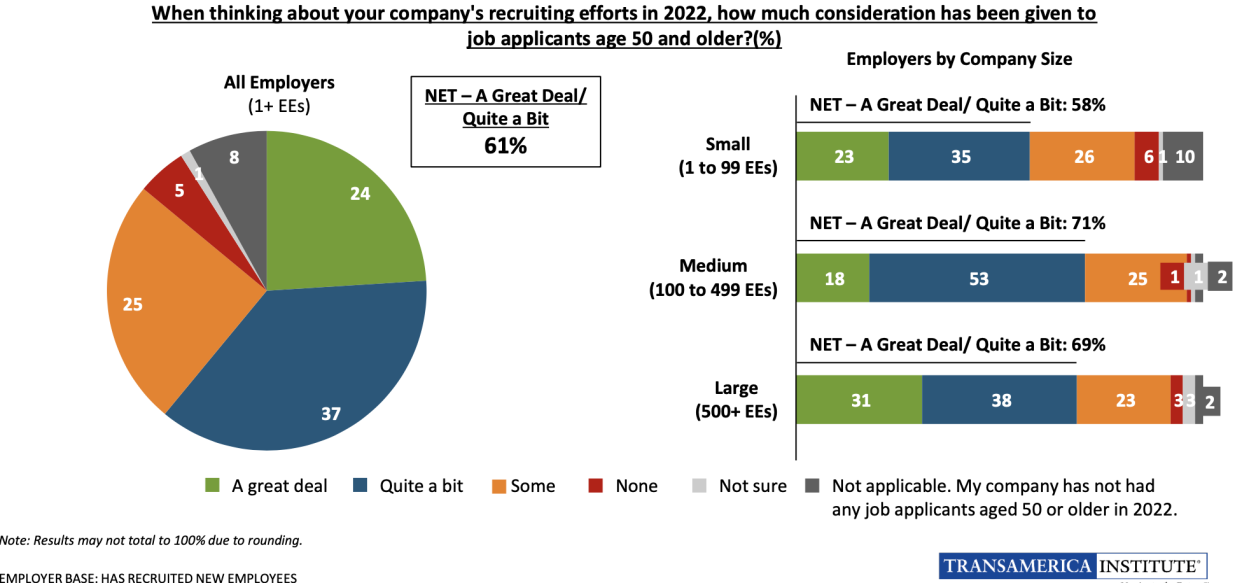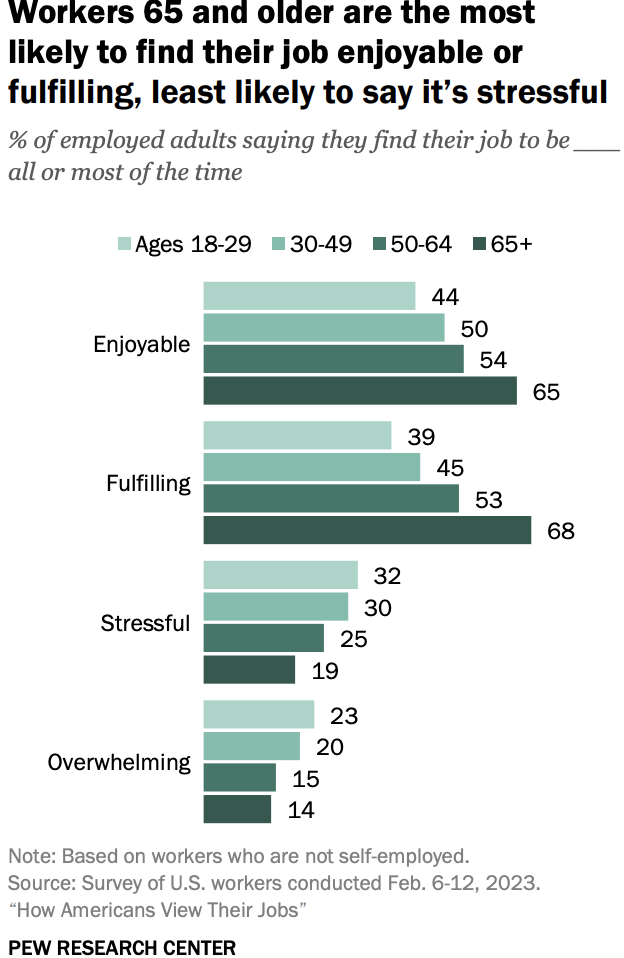Employers are becoming more open to hiring older workers
When Paul Adler turned 65, he didn’t retire. The former IBM executive and later government employee found another job as a substitute elementary school teacher near his home in Bethesda, Md. But the path to get there took persistence.
“There were multiple steps and, surprisingly to me, I kept pushing on,” he said. “What struck me most about the interview was that the interviewer wanted to be sure that, at my age, I was committed to following through. She seemed skeptical that I would really substitute on a regular basis.”
That apprehension about older workers may be changing among employers — finally.
Over three in five employers said they gave a “great deal” or “quite a bit of consideration” to job applicants age 50 and older when recruiting in 2022, according to a new Transamerica Institute workplace survey.
And more than half of employers (53%) agree with the statement, “Many employees at my company expect to work past age 65 or do not plan to retire,” according to the report, which surveyed 1,876 employers and 5,725 workers in a for-profit company.

The results offer hope that workplace ageism may be waning as demographic changes force employers to consider older workers, who often prove to be the most satisfied employees.
“The headwinds encountered by older job seekers are finally subsiding,” Catherine Collinson, CEO and president of the nonprofit Transamerica Institute and Transamerica Center for Retirement, told Yahoo Finance.
“Many employers are now considering age 50-plus job applicants, a segment of the workforce that has been historically overlooked due to ageism,” she said. “In many ways, the pandemic opened doors for both employers and workers as a result of the intense labor shortage and the rapid evolution of flexible work arrangements ranging from schedules to remote work.”
Who is considering older workers?
According to the survey, 71% of medium and 69% of large companies reported giving “a great deal” or “quite a bit” of consideration to age 50+ applicants, more than the 58% of small companies that said so.
And more than half of employers (54%) say that their company culture focuses on professional growth and development among employees of all ages, including those age 50 and older. While few employers emphasize it “a great deal” (17%), more than one in three employers place “quite a bit” (37%) or “some” emphasis on it (34%).
The most frequently cited programs include traditional and or reverse mentorships (48%), job training (46%), and professional development programs (32%). More than a quarter (28%) offer specific training that addresses generational differences and helps prevent age discrimination.

Reversing ageism?
While the word “consideration” doesn’t actually mean the employer gave a worker 50 or older a job, there’s new evidence that hiring is ticking up for workers in that age cohort. The unemployment rate for workers 55 and older decreased from 2.8% in April of last year to 2.3% last month, according to the most recent Bureau of Labor Statistics report.
The Transamerica report suggests that maybe employers are finally catching on to the stark demographic reality. By 2030, 1 in 6 people in the world will be 60 years or older, according to data from the World Health Organization. Three years ago, the number of people 60 and over had already outnumbered children younger than 5.
“The collapse in fertility rates globally, and increasing life expectancy, will result in a sharp decline in working-age populations,” Bradley Schurman, a demographic strategist and the author of “The Super Age,” told Yahoo Finance.
“Older employees leaving the workforce could particularly jolt industries that rely on knowledge and expertise,” he added. “That kind of loss of expertise will put a pressure on companies to find ways to recruit and retain older workers — an easy solution. Businesses who don’t make accommodations won’t survive.”
That said, age discrimination remains a stumbling block for some workers. As baby boomers continue to age, they find that they need to keep working to meet their financial obligations, “but many believe they’ve been denied a job because of their age,” Ramona Schindelheim, editor-in-chief of WorkingNation, told Yahoo Finance.
A survey published by AARP revealed that nearly 4 in 5 of older workers say they've seen or experienced age discrimination in the workplace — the highest share since the organization began surveying on the topic in 2003.
That’s what makes the Transamerica report compelling. Change, as Collinson noted, may be on the horizon. Only 5% of employers did not consider age 50+ job applicants, according to the report.
“That’s very encouraging to me,” Collinson said.
Older workers ‘most satisfied’
For those employers who hire and retain older workers, the payback is happy workers.
Those workers who are most satisfied in many aspects of their jobs are the older ones, according to a Pew Research Center survey conducted in February of 5,188 U.S. adults working part or full time.
“Though they make up a small share of the labor force (7%), older workers are among the most satisfied with their job overall and with various aspects of their job, such as their relationships with their co-workers and their manager,” Kim Parker, Pew Research Center’s director of social trends research, told Yahoo Finance. “They’re also more likely to find work enjoyable and fulfilling, and less likely to find it stressful or overwhelming, compared with younger workers.”

Two-thirds (67%) of workers ages 65 and older say they’re extremely or very satisfied with their job overall, compared with 55% of those 50 to 64, 51% of those 30 to 49, and 44% of those 18 to 29.
They are also the most likely to say their employer cares about their well-being a great deal or a fair amount. The survey found 61% of those 65 and older say this versus just about half in each of the three younger groups.
Count Adler among those who are extremely satisfied with his job.
“I wanted to keep working and find a purpose at this stage of life, and there is a vibrancy from being around younger people that is not quantifiable,” Adler added.
He’s also good at it, his colleagues have found out.
“Teachers now call and email me directly to see if I could substitute for specific classes on specific days,” he said. “I follow the teacher's instructions, keep the students on track and on time, answer some academic questions and explain topics they struggle with.”
As for aging being an issue: “I haven’t experienced any ageism, although some kids have told me I'm older than their grandparents.”
Kerry is a Senior Reporter and Columnist at Yahoo Finance. Follow her on Twitter @kerryhannon.
Read the latest financial and business news from Yahoo Finance
